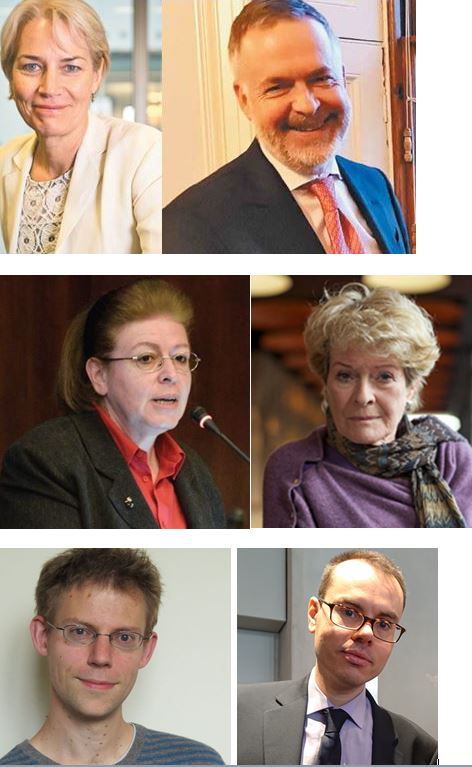Sunday 23 February 2020, The Sunday Times, Deputy Editor Sarah Baxter, wrote her modest proposal for the reunification of the Parthenon Marbles, aptly entitled: "The sane move is to give Greece back its Elgin marbles".
The first 'modet proposal' was written by Christopher Hitchens (pages 104 to 106) in the third edition of 'The Parthenon, The Case for Reunification' published by Versoin May 2008 and launched at Chatham House by the BCRPM. The second was written by Stephen Fry in 2011, you can read that here too.
Sarah Baxter attended the International Conference: 'The Reunification of the Parthenon Sculptures' in Athens on 15 April 2019 and saw for her self "the marvellous museum facing the Acropolis that was built 10 years ago to house the marbles — much lighter and more beautiful than the windowless strip devoted to the sculptures that is admired" at the British Museum. She also spoke at the conference which was hosted by the President of the Hellenic Republic, Prokopios Pavlopoulos.
In the Sunday Times of the 23rd of February, Sarah Baxter suggestes the UK had "no need to keep the marbles when it was possible to access the “universal” culture, so prized by the British Museum, by the clever use of technology. As mayor of London in 2016, Johnson had welcomed to Trafalgar Square a 3D replica of the beautiful arch of Palmyra destroyed by Isis in Syria. And, of course, his own trusty bust of Pericles, the “populist” who ordered the construction of most of the Acropolis, is a fake — and none the less inspirational for UK's prime minister."
Sarah's article can be accessed on line or follow the link here.
Following on from Sarah's article, the Director of the British Museum, Dr Hartwig Fischer wrote a letter, which was published on 01 March:
This email address is being protected from spambots. You need JavaScript enabled to view it.
Sunday March 01 2020, 12.01am, The Sunday Times
Greeks should be glad we have the marbles
Sarah Baxter’s column on the Parthenon sculptures asks us to imagine how we would feel if Big Ben had been transplanted to Athens (“The sane move is to give Greece back its marbles”, Comment, last week). This is to ignore the many buildings and artworks that have been reused, reshaped and often moved across borders, such as Duccio’s altarpiece the Maesta, elements of which have been removed from Siena cathedral and are held in museums across Europe and America.
The Parthenon sculptures are fragments of a lost whole that cannot be put back together. Only about 50% of the original sculptures survive from antiquity. The Parthenon has become a European monument precisely because its sculptures can be seen not only in Athens but in London and other European cities. The public benefit of this distribution and what it means for our shared cultural inheritance is self-evident, and something to celebrate.
Hartwig Fischer, director, British Museum
Minister of Culture for Greece, Dr Lina Mendoni also responded by saying that Dr Fischer's letter was as “unfortunate, if not outright unacceptable.” To read one of the article's quoting Dr Mendoni, follow the link here.
As expected, this was not well received by most not just in the UK but elsewhere too. Yannis Andritsopoulos, London Correspondent for Ta Nea, Greece's daily newspaper, wrote an article following on from Dr Fischer's letter to the Sunday Times, quoting a number of BCRPM members including Janet Suzman, Alex Benakis, Dr Peter Thonemann and Professor John Tasioulas. An English version of the Ta Nea article can be read here.
As Chair of the BCRPM, Janet also submitted a letter to the Sunday Times, which is printed in today's paper, alongside one from Dr Peter Thonemann Professor of ancient history, Wadham College, Oxford and a member of BCRPM. The online link is here and the texts for both letters are below:
Behind the Times at the Museum
Hartwig Fischer, the director of the British Museum and a respected art historian, fails to find a credible parallel for the Parthenon’s dispersed marbles (“Greeks should be glad we have the marbles”, Letters, last week). This is not surprising: there is none.
Thinking people in London were holding anguished debates on the merits of keeping the marbles 200 years ago. They still are. What has changed is the mood abroad: colonial acquisitions are regarded with an increasingly active disdain.
The Greeks have waited for the return of the marbles since 1843, with great dignity and patience. After his latest utterance in defence of the indefensible, Fischer should be aware that patience is wearing thin.
Janet Suzman, chairwoman, British Committee for the Reunification of the Parthenon Marbles
Hack job
Since the Parthenon frieze cannot be fully put back together, Fischer thinks that having its sculptures spread around London and other European cities is a “public benefit” and “something to celebrate”.
My local museum doesn’t have any bits of the Parthenon, and the British Museum has loads. It’s not fair. I wonder if Fischer might be persuaded to hack a few pretty bits off his sculptures and send them our way. If the division between Athens and London is to be celebrated, surely dividing them further would be even more beneficial.
Peter Thonemann, Professor of ancient history, Wadham College, Oxford (member of BCRPM)
Read Janet Suzman's letter sent directly to Dr Fischer on Friday by post and by email.
Images from left to right: Sarah Baxter Deputy Editor of the Sunday Times, Dr Hartwig Fischer Drirector of the British Museum, Dr Lina Mendoni Greek Minister of Culture and Sport, Dame Janet Suzman BCRPM, Dr Peter Thonemann, Professor of Ancient History, Wadham College, Oxford and BCRPM member
